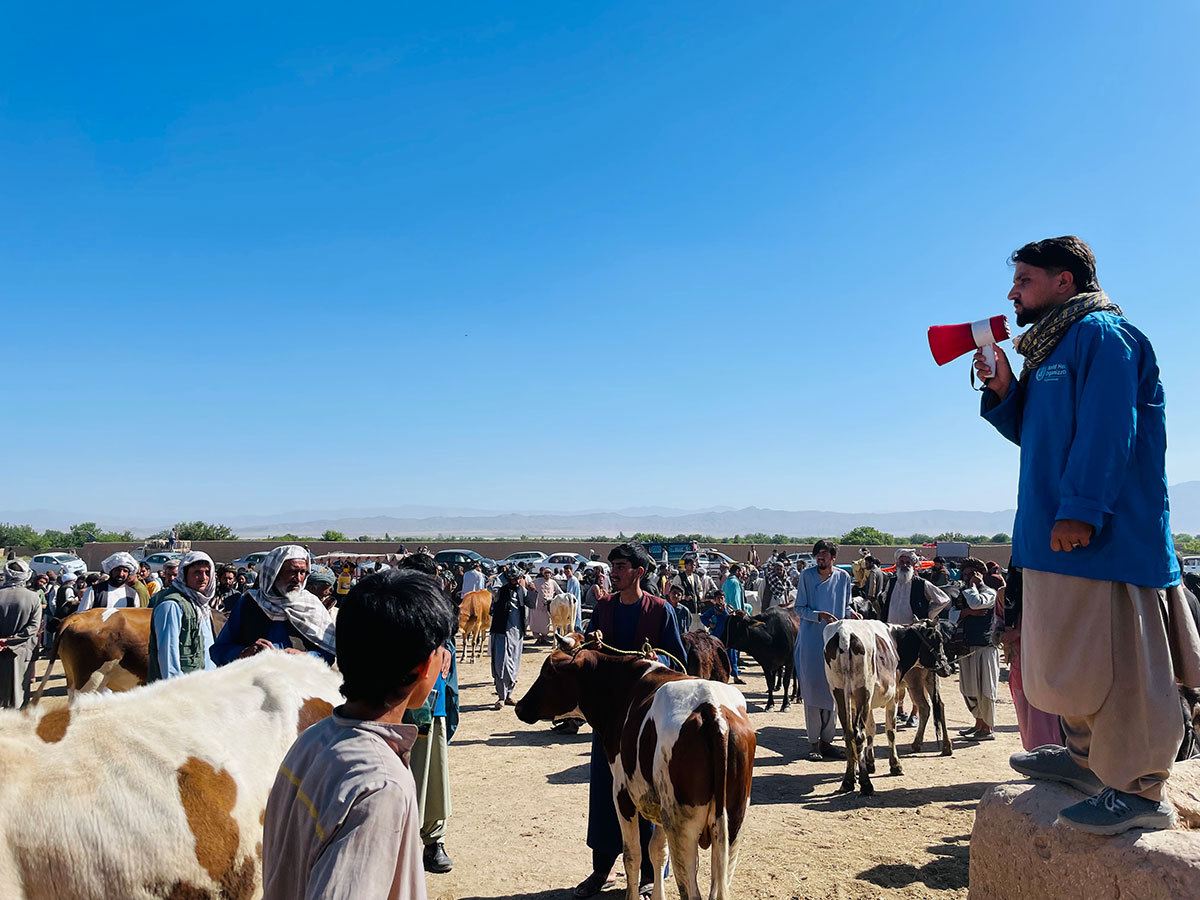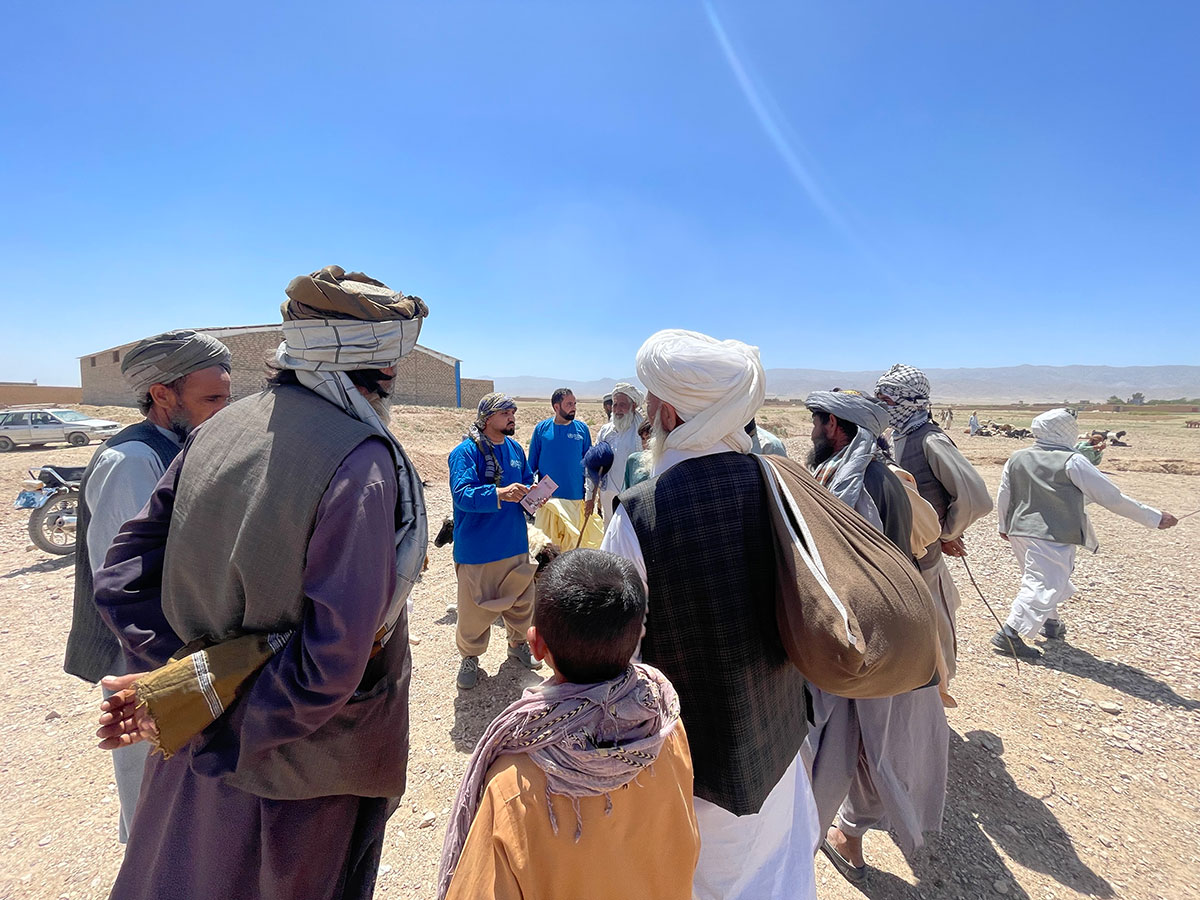 Abdul Rahman Mansouri delivers health messages about CCHF prevention at an animal market in Pashtun Zarghun district, Herat. Photo credit: WHO/M. Islami26 June 2024, Kabul, Afghanistan – In remote areas of Afghanistan, infectious diseases continue to pose a daily threat to communities with limited access to health care and preventive measures. Of most concern currently are the life-threatening diseases like Crimean-Congo haemorrhagic fever (CCHF), acute watery diarrhoea (AWD) and measles.
Abdul Rahman Mansouri delivers health messages about CCHF prevention at an animal market in Pashtun Zarghun district, Herat. Photo credit: WHO/M. Islami26 June 2024, Kabul, Afghanistan – In remote areas of Afghanistan, infectious diseases continue to pose a daily threat to communities with limited access to health care and preventive measures. Of most concern currently are the life-threatening diseases like Crimean-Congo haemorrhagic fever (CCHF), acute watery diarrhoea (AWD) and measles.
In response, WHO Afghanistan launched a targeted risk communication and community engagement (RCCE) campaign in June 2024, covering the provinces of Balkh, Herat and Kandahar. The campaign trained and deployed 110 community mobilizers to conduct mass awareness activities focusing on the prevention of CCHF, AWD and measles. The activities aimed to equip locals with the knowledge and tools to protect themselves and their communities from these diseases.
Abdul Rahman Mansouri, a 22-year-old community mobilizer in Pashtun Zarghun district, Herat province, is one of the recruits. The story of his social mobilization began in 2021. It was Eid-ul-Adha season when his mother was admitted, due to lung cancer, to Herat Regional Hospital, the only tertiary hospital in western Afghanistan. “I spent 21 days in the hospital to take care of my mother. It was there that I saw several people hospitalized due to CCHF infection,” Mansouri said. “A few of them, we were told, died within the first 3 days.”
Seeing the suffering of CCHF patients and the emotional pain of their relatives had a lasting impact on Mansouri. “I decided to try my best to promote health in my community and save people’s lives,” said the community mobilizer from Herat.
Mansouri was able to work towards his goal in June, carrying out WHO-supported mass awareness activities on CCHF, as part of the RCCE campaign funded by the United States Agency for International Development (USAID). “This was an opportunity that I had waited years for and I am confident it can be a positive step towards saving people’s lives from this viral disease,” he said.
Mansouri led a team of 5 community mobilizers, including 2 women, to oversee awareness sessions across Pashtun Zarghun district, Herat. He and his teammates visited health facilities, schools, mosques and community centres as well as bazaars, animal markets and slaughterhouses to raise awareness about CCHF, its transmission and prevention.
CCHF is a viral haemorrhagic fever transmitted to people either by tick bites or through contact with infected animal blood or tissues during or directly after slaughter. Most cases have occurred in people involved in the livestock industry, such as agricultural workers, slaughterhouse workers and veterinarians.
In the absence of a vaccine for CCHF, reducing infection among people rests on raising awareness of risk factors as well as preventive measures people can take to reduce their exposure to the virus.
“Our team have received immense appreciation and support from community members, elders and religious leaders,” explained Mansouri. “An elderly person approached me with mixed feelings of being bothered and appreciative and said: ‘This is a fatal disease while we are constantly in contact with animals. I will make sure all people in my village know about it.’”
 Abdul Rahman Mansouri provides health information to a group of livestock owners in Pashtun Zarghun district, Herat. Photo credit: WHO/M. Islami“RCCE is an integral part of WHO programming in Afghanistan,” said Dr Jamshed Tanoli, acting WHO Representative to Afghanistan. “We have been working with health partners and communities during various disease outbreaks to build national capacities and empower vulnerable communities with health information and prevention messages to protect themselves from infectious diseases.”
Abdul Rahman Mansouri provides health information to a group of livestock owners in Pashtun Zarghun district, Herat. Photo credit: WHO/M. Islami“RCCE is an integral part of WHO programming in Afghanistan,” said Dr Jamshed Tanoli, acting WHO Representative to Afghanistan. “We have been working with health partners and communities during various disease outbreaks to build national capacities and empower vulnerable communities with health information and prevention messages to protect themselves from infectious diseases.”
WHO Afghanistan extends its gratitude to USAID for its generous support of this far-reaching and impactful RCCE campaign.


